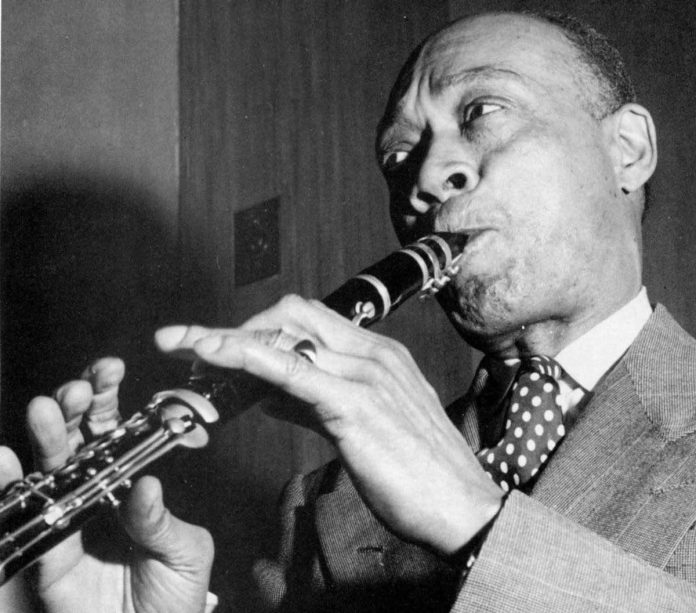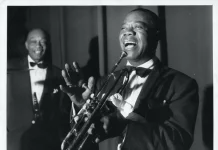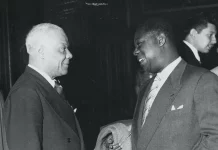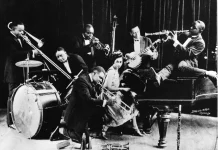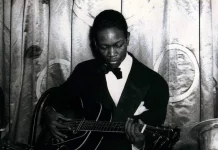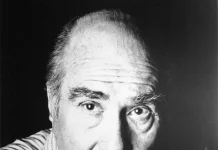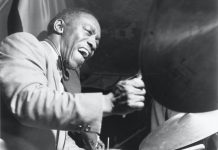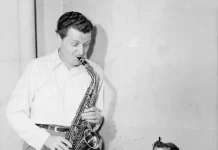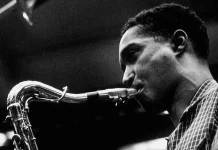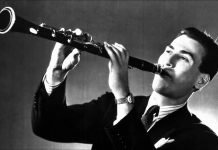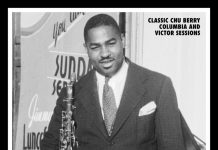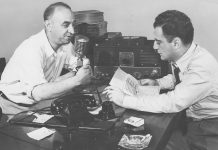Manfred Selchow’s 640-page book Profoundly Blue must surely be one of the greatest achievements in the literature of jazz. It seems to have every detail of Edmond Hall’s life, along with a limitless collection of rare photographs and copies of relevant publications. Apparently only 500 copies of the book were printed, so it has become an expensive collectors’ item. I reviewed the book in my column in 1989.
Ed was in Los Angeles when Eddie Condon phoned to ask him to join the band at the Condon club, despite the fact that it was intentionally maintained as an all-white group. After he joined there was occasional turmoil in the club when visitors from the South objected to Ed’s presence. What follows here shows the depths to which the situation sank and is mainly taken from a report quoted in the book. This part was originally written by Richard Carter and appeared in The Daily Compass on 17 October 1951. It refers to a 10-minute film short eventually made that year. (I have corrected the common misspelling of Ed’s name as “Edmund” where it occurs and done slight editing):
“Edmond Hall is world-famous as a jazz clarinettist. He is a Negro.
Columbia Pictures Corp. tried yesterday afternoon to bar him from appearing in a short film for which it had hired the Eddie Condon band, of which he is a member. The film’s producer, Harry Foster, explained that if a Negro were to be shown playing the same bandstand with white musicians, movie operators in eight Southern states would refuse to rent the movie. This, he said, would be bad for business.
The short was to be shot in Condon’s Greenwich Village place. By agreement between the movie firm and Condon, Hall was to play clarinet for the soundtrack and Peanuts Hucko, a well-known white clarinettist, was to sit in for the actual filming.
Hall, who is 50 and has been predominant in his field for many years, refused to go along with this arrangement. He called his union, Local 802 of the American Federation of Musicians.
‘I’ve been playing for 35 years,’ he said. ‘This is the first time I’ve had it slapped at me direct.’
Before union officials arrived in the nightclub there was a great deal of milling around and consultation between Condon and Foster, Condon and Hall, Condon and other members of the band, other members of the band and Hall.
Asked to enlarge on his position in the matter, the perspiring Foster said: ‘We’re not going to fight the Civil War all over again. It’s the same as Lena Horne. They cut out her scenes in the South – don’t they? We put it up to Condon. If Hall is in the picture then Condon gets no publicity in eight Southern states. We have no objection to Hall personally. It’s like Lena Horne.’
Condon, a bantie rooster type equally celebrated as raconteur, nightclub operator and guitarist, said: ‘I can tell you three words about this kind of thing. I’m against it. But this movie is important. It’s important on payday. On payday everybody gets paid at Eddie Condon’s. What are you going to do? I don’t care if it’s Columbia or what have you. If I kick them out of here they go next door and do the same thing. Just remember, everybody gets paid on payday.’ He also declared that he had performed as part of the first mixed Negro and white band ever to make a jazz record. [Louis’s Mahogany Hall Stomp and Knockin’ A Jug, recorded on 5 March 1929 – SV]
Asked if his rebellion might lose him his job, Hall answered ‘I don’t care. I can always get a job. I feel uncomfortable and out of place now anyway. I’m going to stand up for the principle this time. I’m going to see it through.’
The arrival of Local 802 Secretary-Treasurer Charles B Iucci with two of the union’s business agents was an occasion for emotion. Iucci said: ‘Hall is a member of my union. I won’t tolerate this sort of thing.’ Foster said: ‘This is nothing new. We have no control over the South.’
‘Maybe not,’ replied Iucci, ‘but I have control over my members. Either Hall plays or nobody plays.’
‘But we’ve been doing this kind of thing for 25 years. Why all of a sudden do you pull this in the middle of shooting a picture?’
‘You should be ashamed of yourselves,’ answered Iucci. ‘This is the North. This isn’t the South. We don’t stand for this here.’
Condon and Iucci then retired to a private office. Foster resumed to Hall: ‘What can we do about the society. That’s the way they are.’
‘They are the way they are because you keep supporting them,’ said Hall. ‘If you don’t think they should be that way, why do you support them?’
‘This whole thing is very unfair to us,’ said Foster. ‘It’s costing $1,000 an hour while they sit around and talk.’
‘Unfair to whom?’ asked Hall.
Foster joined the Iucci-Condon confab and emerged in a more carefree frame of mind. ‘We’re going to shoot two versions,’ he said happily. ‘One for the North and one for the South.’ This was defined as one version with Hall and one without.
Asked what the union proposed to do if the version with Hall is not produced and the all-white one is submitted to the nation’s exhibitors, one of the union officials said: ‘Then we’ll have a quarrel with Columbia.’
One of the members of the band said: ‘Maybe now is the time to have the quarrel. Maybe we shouldn’t play without Ed on the stand.’ Somebody else said: ‘It’s up to the union.’
Foster called brightly to Hall: ‘Okay Ed. On the stand! We’re shooting.’
Hall refused to go. Iucci assured him everything was all right. He went.
One of the bandsmen said: ‘I think maybe this stinks. I think maybe they won’t bother to have a Northern and a Southern version of a short like this. I think maybe they’ll only make the Southern version and show it in the North too. I think maybe I should quit.’
The musicians, all famous in their field, are Wild Bill Davison, Cutty Cutshall, Gene Schroeder, Bob Casey, Buzzy Drootin and Hall and Condon.
Said Foster: ‘We’re going to make a Northern and a Southern version. One for the North and one for the South.’
And that’s precisely what they did. One with the Negro clarinettist and one with the white clarinettist pretending to blow the notes already recorded by the Negro.”
The film eventually reached England and, regarding it as a major event, I made a long journey to see it. I don’t remember the sound of the clarinet, but I do remember a horrible vocal by the repulsive Johnny Ray.

